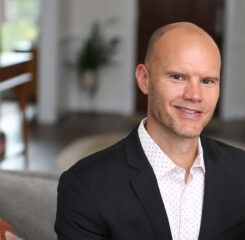FutureCAST Interviews Russell Lusak and Roberta Jacobsen
In this month’s FutureCAST videos, we learn from two executives how they are paying attention to policy, redeveloping their communities, and focusing on their culture. They also share how CAST has helped their organizations:
- Russell Lusak, Chief Operating Officer at Selfhelp, a CAST Patron.
- Roberta Jacobsen, President at Front Porch, a LeadingAge Provider Member.
FutureCAST is a CAST video series asking 24 health care executives where they think health care technology is headed and how CAST can play a role. Susheel Ladwa, Chief Editor at DistilNFO and co-chair of the America’s Health Insurance Plans (AHIP) IT Advisory Group, who was formerly with IBM Cloud Services, leads these discussions.
The interviews were held at the 2017 LeadingAge Annual Meeting & EXPO and are being featured in Tech Time throughout 2018.
Russell Lusak, Chief Operating Officer, Selfhelp
Russell Lusak is Chief Operating Officer at Selfhelp, a CAST Patron. A Licensed Nursing Home Administrator, Lusak has more than 18 years of experience in the healthcare field. He brings unparalleled experience as an administrator, with a strong knowledge of organization dynamics, the egulatory home care landscape, and systems analysis. He has also proven to successfully reengineer programs with exceptional results.
Watch the video, and read the full transcript.
Susheel Ladwa: Because of the administration changes, there is a lot of uncertainty in terms of what healthcare is going to look like in the future. How is Selfhelp addressing this change, and what would be your advice to healthcare executives that are going through this process of change?
Russell Lusak: Pay attention to policy, because the small things that you don’t see really get you. Selfhelp has been involved with a lot of policy changes. We are positioned on statewide committees, and we listen for the little things.
Right now we are looking at drastic cuts in Medicare, and we are assessing the federal government’s policies on block grants and the potential impact it will have in New York state; there could be a major hit of $150-160 million to our sector.
As far as other executives and what they should be paying attention to, the states are changing payment methodologies by moving toward value-based payment, away from fee-for-service. The ball is moving from institutional care, inpatient setting, into what the hospitals define as an outpatient setting, which is really a euphemism for home care.
What the hospitals are looking to do is to move their patients from their outpatient settings of brick-and-mortar into the home. They think they can do it quicker by allowing their staff to go into the home and actually visit patients as opposed to partnering with post-acute providers who exist in the community; they are trying to replicate what it is that we do already.
So I ask my fellow executives to pay attention to the policies. When considering a buy versus build mentality, consider value-based payments and community-based partners. You have to pay attention to the policies impacting your operations the most and build greater community partnerships.
At Selfhelp, we are looking at policy and starting to take a really deep dive in the area of data. You have to understand the populations that you serve; understand how to identify at-risk populations so that you can put evidence-based programs in place that allow them to stay at home and out of the hospitals.
Ladwa: You’ve been a founding member of LeadingAge CAST. What is the value that Selfhelp has derived from its association with CAST?
Lusak: The value we have from CAST are the introductions with technology partners. IBM and Microsoft are examples. Early on with CAST, we met with Microsoft, and they helped us to develop the Virtual Senior Center. They supported our marketing, which helped to kick it off. The value that CAST brings to us is the opportunities to meet with technology professionals, in very intimate settings, so we can brainstorm and come up with ideas and suggestions that really help the populations we serve.
To learn about Lusak’s background and his work at Selfhelp, watch the video, and read the full transcript.
Roberta Jacobsen, President, Front Porch
Roberta Jacobsen is president at LeadingAge Service Provider Front Porch, a not-for-profit support system that serves more than 4,300 individuals and families through full-service retirement, active adult, and affordable housing communities. Jacobsen has more than 30 years of experience as a leader in long-term care and retirement living.
Watch the video, and read the full transcript.
Susheel Ladwa: What is the most exciting thing your team at Front Porch is working on today?
Roberta Jacobsen: Right now, we have several exciting projects on the board. First and foremost is the redevelopment of some of our communities, which were older and needed an infusion of capital improvements. We are expanding memory care in three of our communities and completely redeveloping one of our 65-year-old communities in San Diego. From a capital improvement standpoint, that’s exciting.
The other exciting endeavor is our culture of Humanly Possible! Humanly Possible is a commitment that we have to our staff, and our residents, and our broader communities, to be innovative, to explore, to imagine, to experiment, and in turn improve the lives of those we serve.
Ladwa: With the changing administration, a certain amount of uncertainty has crept into the healthcare space. When you make decisions, how do you consider the changes that are in the industry?
Jacobsen: I couldn’t agree more. The changes that we’re experiencing in healthcare are profound, and they will be long-lasting. Healthcare reform in whatever form it ultimately takes has significant implications for our business, and I would recommend that all leaders, as we are doing at Front Porch, seriously pursue long-range strategic planning around healthcare. Consider what the business implications are of the changes we’re experiencing, as well as the implications for our residents and those we serve.
Ladwa: What do you see as the role of technology at Front Porch, and how have you been able to leverage technology for change?
Jacobsen: We’re fortunate we have a very strong center for technology, and innovation, and wellness. In that regard, we have focused some of the technological advancements that we are implementing at Front Porch to meet our residents’ needs. We’ve implemented programs such as It’s Never 2 Late (IN2L), we’re working closely with Amazon, and we have Echo and Dots in over a hundred of our residents’ units. Our focus right now particularly relates to technologies: what technologies we can adapt and improve the lives of those we serve and our residents.
Ladwa: How has LeadingAge CAST helped Front Porch in your IT strategy, in your vision for technology used in the organization?
Jacobsen: CAST has supported Front Porch in our pursuit of some grants and partnerships. We have had the opportunity to collaborate with outstanding, major technology companies, as well as universities. CAST has provided an opportunity for us to have access to those major universities and major technology companies that are focused on the senior living space.
For more on Jacobsen’s career and her advice to a new generation of IT professionals, watch the video, and read the full transcript.

Most Recommended
October 15, 2025
 Shutdown Week Three: Impact of Ongoing Closure on Affordable Housing
Shutdown Week Three: Impact of Ongoing Closure on Affordable Housing
February 03, 2026
Fiscal Year (FY) Funding 2026
October 07, 2025
Immigrant Workforce Matching Program Brings Workforce Relief
Recently Added
February 13, 2026
Redefining Memory Care Engagement: New CAST Case Study
February 13, 2026
Prioritizing User-Informed App Design
February 13, 2026
CAST Members in the News
February 13, 2026



